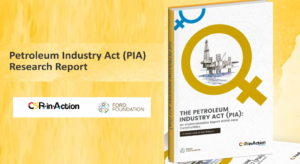 For decades, the relationship between oil companies and host communities in Nigeria has been fraught with deep mistrust, environmental degradation, and unfulfilled promises. The Niger Delta, rich in natural resources, should be a beacon of economic prosperity, yet it remains a hotbed of unrest and poverty.
For decades, the relationship between oil companies and host communities in Nigeria has been fraught with deep mistrust, environmental degradation, and unfulfilled promises. The Niger Delta, rich in natural resources, should be a beacon of economic prosperity, yet it remains a hotbed of unrest and poverty.
When the Petroleum Industry Act (PIA) was passed in 2021, it was meant to correct this imbalance by ensuring oil-producing communities directly benefit from the wealth extracted from their lands. It introduced the Host Community Development Trusts (HCDTs)—a model designed to empower communities to take charge of their own development through a legally mandated 3% annual funding from oil companies’ operating expenses.
Two years later, the question remains: Has the PIA truly fostered community inclusion, or has it simply added another layer of bureaucracy to an already fragile system?
CSR-in-Action sought to answer this question through our PIA Implementation Research Report, a groundbreaking study that assesses how well host communities are integrating into the governance framework of the Act. Our findings reveal that policy alone is not enough—true inclusion requires deeper engagement, trust-building, and systemic accountability.
What CSR-in-Action’s PIA Report Revealed About Inclusion
CSR-in-Action’s extensive field research across oil-producing regions uncovered gaps between policy intent and on-the-ground realities. While the PIA has provided a structured approach to community development, we found that:
- Many host communities remain unaware of their rights under the PIA—with little to no participation in decision-making processes within the Host Community Development Trusts (HCDTs).
- Local governance structures remain weak, with many communities lacking clear representation on how the funds should be allocated.
- Traditional power dynamics continue to sideline vulnerable groups—notably women, youth, and small-scale business owners, limiting the broader impact of the Act.
- The transparency of fund allocation remains a challenge, with some communities unclear on how much has been received and how decisions are made.
While the Act offers a legal framework for financial inclusion and development, our findings indicate that without deeper engagement and accountability mechanisms, the impact will remain limited.
Lessons from the PIA: What True Community Inclusion Should Look Like
1. Inclusion is Not a Favor—It’s a Right
For years, host communities have been treated as passive beneficiaries of oil revenues. Companies, government agencies, and even NGOs have often designed programmes on their behalf rather than with them.
CSR-in-Action’s report highlights that real inclusion means:
- Giving communities voting rights on project selection within the HCDTs
- Ensuring women, youth, and indigenous leaders have decision-making power
- Providing capacity-building programmes so communities can manage funds independently
By shifting from charity-based interventions to empowerment models, communities can co-create solutions that align with their actual needs.
2. Development Must Be Measured by Impact, Not Just Spending
A major challenge CSR-in-Action identified is that many oil companies report their community spending without assessing the actual impact.
- A road may be built, but was it the most urgent need?
- Millions may be spent on education, but are community members gaining real employment opportunities?
CSR-in-Action’s Impact Assessment Framework proposes that success should not just be measured by how much money is spent, but by whether key indicators improve, such as:
- Increase in employment opportunities for host communities
- Local business integration into oil and gas supply chains
- Access to sustainable healthcare and education
If funds are not resulting in long-term economic empowerment, then the system is failing.
3. Trust is the Currency of Development
One of the biggest barriers uncovered in our PIA report is the issue of trust.
Decades of neglect, broken promises, and corporate interference have left communities sceptical of any new initiative. The PIA intended to fix this, but laws don’t build trust—actions do.
CSR-in-Action’s research suggests that:
- Oil companies must practice radical transparency—making budgets and decisions open to scrutiny.
- Independent CSOs should be given oversight roles to ensure community voices are heard.
- Public accountability platforms (such as town halls and digital reporting tools) should be created to track fund allocations in real-time.
A powerful example is Ghana’s Petroleum Revenue Management Act (PRMA), which ensures that community representatives publicly review and report on oil revenues. Nigeria must learn from this model and establish independent monitoring bodies.
Policies Are Not Enough—People Must Be at the Centre
CSR-in-Action’s PIA Implementation Research Report makes one thing clear: no policy can substitute for genuine engagement.
If oil companies and policymakers truly want to move beyond policies to real inclusion, they must:
- Invest in local governance capacity—ensuring that host communities have the knowledge and resources to lead their own development.
- Expand decision-making rights—so community members are not just consulted but actively involved in directing their own funds.
- Create a transparent and accountable system—where every community member can see how funds are used and who benefits.
The PIA provided a starting point, but the real work of inclusion has only just begun.
CSR-in-Action remains committed to amplifying community voices, advocating for transparency, and ensuring that development is truly inclusive.
Download the Full PIA Implementation Research Report here: https://www.sitei.org/pia-research/
What do you think? Should businesses do more than what the PIA requires? Let’s continue the conversation.
References
【1】 Ghana’s Petroleum Revenue Management Act – https://www.piacghana.org/
【2】 CSR-in-Action PIA Implementation Research Report – https://www.sitei.org/pia-research/
【3】 Nigeria’s Petroleum Industry Act Explained – https://www.nigeriaoilandgas.com/pia-explained

